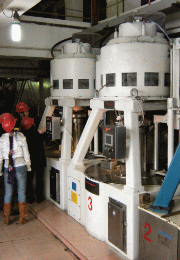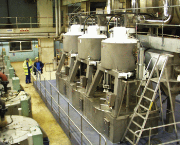 Thomas Broadbent & Sons, a UK developer and supplier of solid liquid separation equipment, is now using Vacon AC variable speed drives with active front end (AFE) technology to recover up to 90% of the energy consumed by the batch centrifugals it supplies to the sugar processing industry.
Thomas Broadbent & Sons, a UK developer and supplier of solid liquid separation equipment, is now using Vacon AC variable speed drives with active front end (AFE) technology to recover up to 90% of the energy consumed by the batch centrifugals it supplies to the sugar processing industry.
The centrifugals are designed for processing massecuite, a mixture of sugar crystals and molasses, which is produced by the crystallisation phase of sugar refining. The centrifugals spin the massecuite in a perforated basket, which typically has a diameter between 1.2m and 1.8m, at speeds of up to 1,200rpm. The liquid molasses is forced through the perforations, leaving behind sugar crystals that are ready to be sent to a granulator for drying.
The batch centrifugals produced by Broadbent work with loads of up to two tonnes, and can process up to 25 loads per hour. The centrifugals are driven by AC motors rated between 160kW and 400kW, depending on the capacity of the machine. Because the operating duty is so onerous, standard motors are not ideal for this application, so Broadbent produces special motors of its own design.
Fitted with a non-regenerative drive, the centrifugals would have a very high energy consumption and, in addition, during braking they would produce a lot of energy that would have to be dissipated as heat. For this reason, Broadbent adopted regenerative drives for its machines as soon as these became readily available. These drives allow the energy produced during braking to be fed back into the supply system, which means that the net energy consumption of the centrifugals is reduced by 80% or more. The problem of heat dissipation is also eliminated.
 New technology
New technology
However, the Broadbent engineers constantly evaluate new technologies as they become available to determine whether they might offer benefits to the users of the company’s machines. As part of this process, they investigated the use of active front end (AFE) drives. These are regenerative drives of a special type that incorporate controllable solid state switches in their input section.
“AFE drives provide high efficiency when operating in both motoring and regenerative modes, and they also generate a much lower level of harmonics than conventional regenerative drives,” said Graham Hindle, chief electrical engineer of Thomas Broadbent & Sons. “We have, however, found that not all drives of this type work well with our higher torque motors.
“We were therefore happy to accept when Vacon offered to supply us with one of its AFE drives for evaluation. Our tests showed that the Vacon drive could readily be tuned to meet our needs and also that it offered better performance than other drives we had tested.”
An added benefit of AFE
Since selecting the Vacon AFE drives as the preferred option for its batch centrifugals, Broadbent has discovered that they offer another significant advantage. They are well suited for use in applications where unpredictable interruptions to the supply are likely to occur, which is a common problem in some of the overseas locations where sugar cane is grown and processed.
With conventional regenerative drives, loss of supply while the centrifugal is braking frequently leads to failure of the main fuses in the drive system. Not only is this a major inconvenience, the fuses are also special semiconductor protection types that are expensive to replace. However, with the Vacon AFE drives, this problem does not occur.
“We’ve now been using Vacon AFE drives for around five years and as well as offering consistently excellent performance, they’ve also proved to be exceptionally reliable,” said Hindle. “We now fit them to our batch centrifugals unless, of course, the end user expresses a preference for drives from an alternative manufacturer.
“We get very good support from Vacon, with prompt deliveries and easy access to expert technical advice and guidance although, in truth, we have rarely needed this. I suspect that Vacon’s repair service is just as good, but the reliability of the drives is such that we really haven’t had enough experience of it to comment!”


